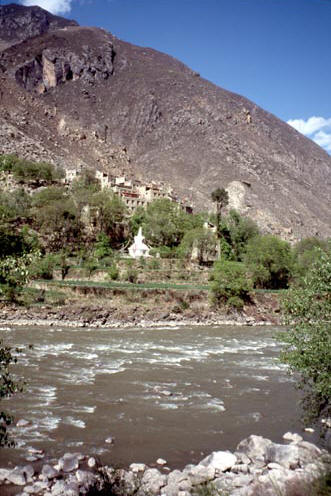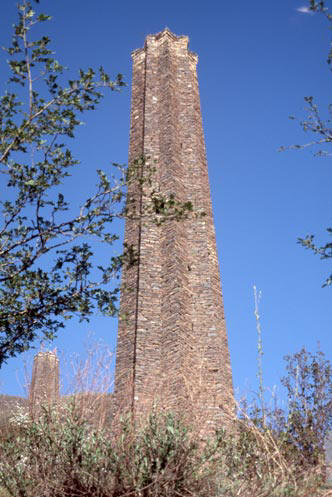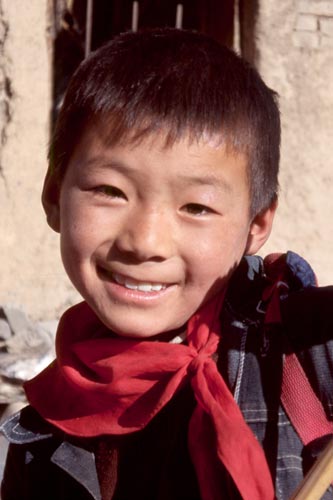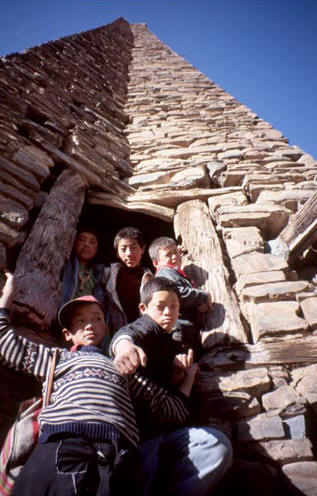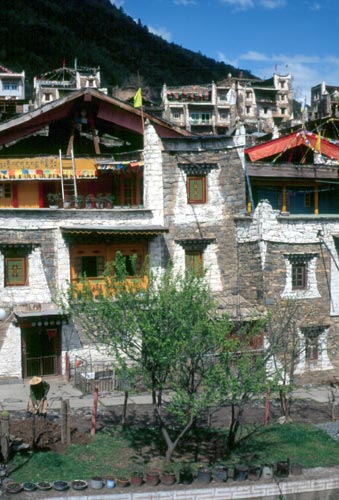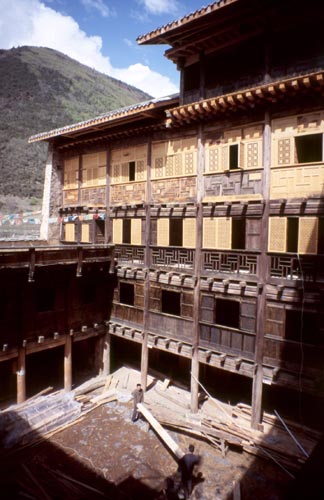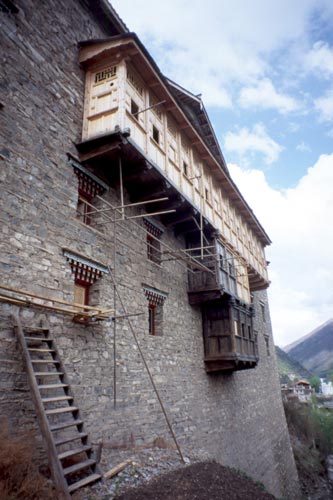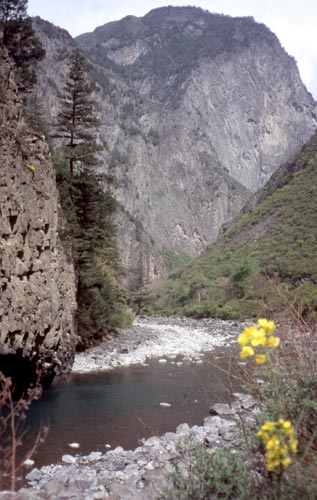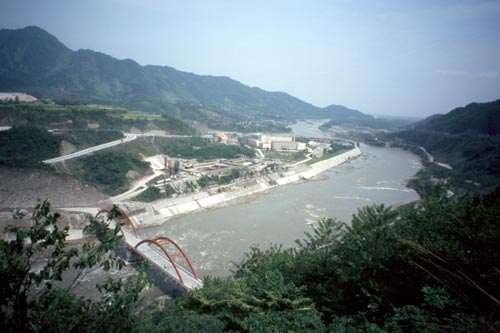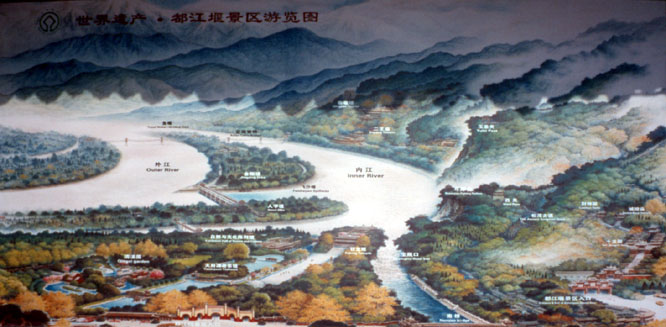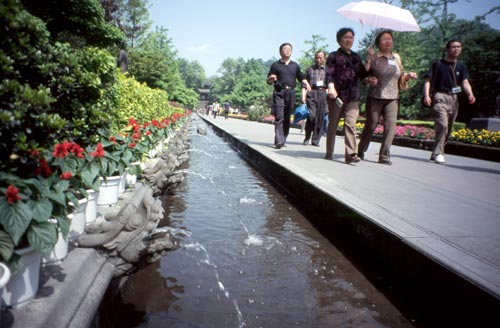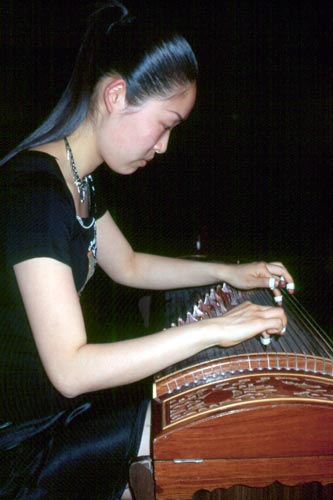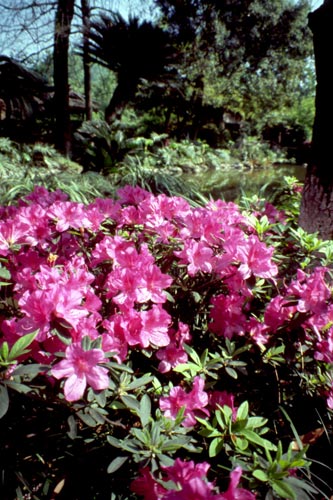|
CHINA THOUGHTS
Happiness
Although most Chinese put in a long, hard day's work
for low wages and have to put up with all kinds of inconveniences, somehow
they nearly always manage to be cheerful. This is one of the delights of
traveling in China.
Health
The Chinese definitely need to improve their living
habits—smoking, spitting, and industrial pollution here are among
the worst in the world. On the other hand, restaurant people are good about "boiling
it, cooking it, peeling it, or forgetting it." I've always been able
to get boiled water at hotels and restaurants.
Bill's Health
I mentioned that "Bessie Too the Bicycle"
has held well up for the entire trip without a visit to a bike shop. Bill
did even better over the four months, without getting sick or suffering
an injury despite some long, tough days. That's partly because cycling is
such and enjoyable sport that one tends to be happier and physically stronger.
Wealth
If you're wondering why petrol prices are so high, one
reason is that wealthy Chinese love to drive big SUVs. I've seen a few Hummers,
but Mitsubishis, Toyotas, and Jeep Cherokees are the most popular. While
some Chinese do very well financially, the majority do not. Unemployment
remains one of the government's biggest challenges.
Safety
Chinese drivers are well accustomed to dodging slower-moving
objects on the road and have a marvelous ability to survive near misses.
I use a rear-view mirror to keep an eye on what's going on while I'm cycling.
Nearly all Chinese are honest, with bill padding at restaurants and hotels
the main hazard. Theft is said to be a danger at bus and train stations
and on crowded buses and trains, places I easily avoid. Cyclists have lost
their money belts to thieves elsewhere, however, so I try to be very careful.
The Chinese Government
You have to give credit to the leaders
of this police state for successfully guiding their huge population on an
unprecedented growth rate for the past two decades. The government has also
managed to hold the country together despite the aspirations of some minority
groups, especially in the west, to break away. The Chinese people really
seem to enjoy their current economic freedoms, though democracy does not
seem to be on the horizon. No Chinese on the mainland have ever told me
that they desire a democracy. The problem with China's one-party system
is that it lacks checks and balances; corruption at high levels is said
to be a major problem in the country's development. The government also
HATES criticism—most citizens know better than to risk the wrath of
officials! The US government's latest human rights report about China was
not appreciated, and the Chinese responded with a scathing report of their
own about crime and Iraq prison abuses of the United States.
Chairman Mao Zedong
The "Great Helmsman" still appears
on posters, currency, and as massive statues. The Chinese remember him as
a resourceful leader against the Japanese during WWII and as one of the
founders of the Peoples Republic of China. While he helped lift the country
out of the economic depression caused by WWII and civil wars, his policies
also led to famines, invasion of Tibet, and the terrible persecutions and
destruction of the misnamed Cultural Revolution (1966-70). Today, Mao's
communist policies have fallen by the wayside, but he remains a folk figure.
China Transformations
This is my fourth visit to mainland China,
with the first one back in 1982. That trip was totally unplanned. When China
opened to tourism, only groups could come and each member had to pay about
$100 per day—way, way over my budget. But on a cycling trip through
East Asia in early 1982, I stopped off for a brief visit to Hong Kong and
found my hostel flooded with travelers who had just come back from mainland
China. The country had just opened to low-cost independent travel! I stored
my bicycle and took off on a six-week grand tour of China. Travel remained
highly restricted—if a place wasn't on my permit, I couldn't go there—so
cycling touring didn't seem to be an option. There were no guidebooks at
the time, so I relied on other traveler's notes about what to see and where
to stay—it was a great adventure. I found city streets streaming with
bicycles as nobody had private cars then. Shops were filled with drab merchandise
that nobody especially wanted, but tourists and well-connected Chinese could
use black-market money to visit the Friendship Stores, which had the good
stuff. A few daring young women wore Western fashions, but most everyone
else only had dark, dull, monochromatic clothing of the Communist era. I
was back in the steam age—the sound of steam whistles was common and
I often rode on steam trains, even on the main lines. Shanghai, especially,
looked like a city in a 1930s black-and-white movie; the old architecture
had hardly changed since the Communists took power.
Tibet
My descriptions of traveling in Tibetan lands of northern
Yunnan and western Sichuan may have been a bit confusing because these are
no longer part of Tibet. When China occupied Tibet, large chunks were lopped
off into Yunnan to the southeast, Sichuan to the east, and Qinghai to the
north. The remaining parts of Tibet became the Tibetan Autonomous Region
(T.A.R.) even though the Tibetans have no autonomy! The Tibetans I met in
Yunnan and Sichuan seemed to be doing well. The government also seems to
be allowing a fair amount of religious freedom.
Newspapers
I've never been to a country with so few of these.
Only the cities have newspapers, and only tourist centers have anything
in English. Of course, the papers that do exist only print what the government
approves. Most Chinese prefer to get their news and entertainment from television.
Internet Cafes
One frequently hears of government crackdowns
on these based on moral grounds. Here I'm 100% with the authorities. Most
Internet Cafes in China are dark, dismal, filthy, smoky dives that desperately
need either closing down or cleaning up. The Chinese are at their worst
here; most users come to play games or watch movies. The computers are aging
machines without software updates. At least they are cheap and often have
useable Internet access. I try to find Internet computers elsewhere, such
as in hotel business centers or Westerner-friendly guesthouses.
The Great Firewall of China
I've never found a computer
with high-speed Internet in China. Part of the problem may be the
government monitoring of e-mail and websites that probably takes place.
Some sites are temporarily or permanently blocked. The BBC's site has
been blocked at times in the past, for example, though I've usually been
able to access it.
Hotels
My guidebook tells a humorous story of a "typical"
Chinese hotel where the Western guest encounters one problem after another;
when his head finally hits the pillow, loud karaoke downstairs starts up.
Hotel descriptions in the guidebook usually feature dormitories as the top
budget option. But hotels have improved greatly in recent years. The biggest
improvement has been the dropping of "foreigners prices" that
once doubled or tripled a room's cost; this was purely racist as hotels
gave overseas Chinese the regular price. Another government trick to rip
off Westerners was the police policy of only permitting the more expensive
hotels in town to accept foreigners; thankfully that has also largely been
abandoned. Privatization and new construction has increased competition,
raised standards, and lowered prices. Few hotels meet Western standards,
but then few charge Western prices. I've paid between $1.20 and $12 for
rooms and often get a private bath. Only once did I stay in a dormitory,
and that was in a tiny village. Of the few hotels/guesthouses that refused
me, some were genuinely full, one was run by a cranky official, and one
claimed to lack a police permit for foreigners.
Camping
The Chinese are not into this activity, except for
the nomads of course, but I found carrying a tent worthwhile. I camped four
times in China, three of which were at idyllic spots near a stream.
Cycling
I've been pleasantly surprised just how good
traveling by bicycle is in China. I highly recommend it! My only
previous cycle ride in China was across Tibet from Lhasa to Katmandu,
though I don't really think of Tibet as actually being a part China.
In the afternoon I got together with cyclist Peter Snow Cao, at a teahouse for an
enjoyable afternoon of chatting about cycling. He ran the bicycle tour
company Bike China Adventures for many but has since moved to San
Francisco and a new owner took over the company
http://www.bikechina.com/
A Guaranteed Weight-Loss Program
Looking for a sure-fire plan
to lose weight, while eating whatever you like? Well, all you need to do
is grab your bicycle and head over to the Himalaya! A high-altitude bicycle
ride will melt those pounds and kilograms away. I'm on my last notch of
my belt and my pants fit like a circus tent.
|
